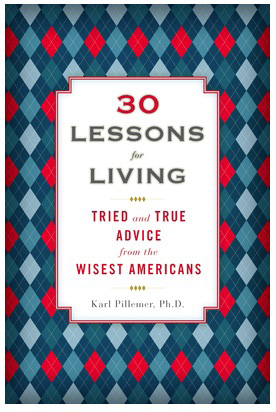In this book, renowned gerontologist Karl Pillemer, Ph.D. does something our society sure needs to do more of—listen and learn from our elders. He writes, “fear of aging is rampant in our society. Surveys over the past two decades show how pervasive negative attitudes American hold about aging.”
He asks, “What if our views about old people and aging are absolutely wrong?” In 30 Lessons For Living, he shows us how the answer is “yes” to this question. With the words of elders themselves, we learn how “the view from seventy and beyond turns conventional thinking about aging on its head.”
Over a period of five years, he collected thoughts from over a 1000 older Americans. He invited them to write answers to questions relating to what they have learned over the course of their lives, then conducted a national survey of over 300 people 65 and older and the questions went deeper. Then he went even further and did in-depth interviews with about 300 “nominated elders” (by individual and organizations who considered them particularly wise) from all walks of life.
They have done nearly every job from “carhop to restaurant owner, from enlisted man to commanding officer, from factory worker to factory owner.” They were athletes, coaches, farmers, teachers, tradespeople, CEOs, artists, writers, and actors. We hear from “the entire spectrum of the American workforce across the country in the last century” in this book.
Pillemer believes our elders are the wisest Americans, and calls them “the experts” throughout. Pillemer outlines lessons these experts can give us, including what makes a marriage go the distance, how to find a fulfilling work life over the course of your working life, lessons for aging “fearlessly and well,” and how to live without regrets. And does not speak for them; throughout, we get direct quotes from the elders themselves.
These experts’ advice often goes against conventional wisdom, and may sometimes (delightfully) strike you as counterintuitive. You’ll have to read it to find out about these things, but I will tell you that many say that old age was “a time of great opportunity and contentment” – more than they ever imagined. Love hearing that!
Pillemer ends with a section that gives us great questions to ask of “experts” in our own lives, inviting us to find the wisdom in the people we know.
I put this book in the category of best nonfiction books that addresses mindsets that need to change, in this case, towards our elders. It’s for anyone who wants to part with the old negative attitudes about aging, be inspired by those older than you, and to learn from them about how to live true and fully in one’s later years.



